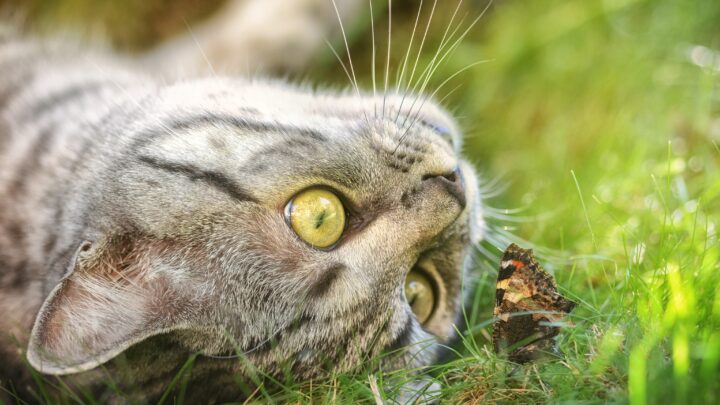“Can cats eat moths?!”, you can hear your own voice screaming inside of your head as you’re watching your mischievous monster chase after an odd-looking beast. “She won’t actually… bite into one, she’s not that crazy!”, you keep reassuring yourself unaware of what to do when you’re faced with such a situation.
Do you chase after both of them hoping to reason with your four-legged friend? Do you scream your lungs out enough to get her to stop for a moment? Or do you let her do her thing and hope that something as unassuming as a moth won’t send her to the emergency animal center?
And right when you think things couldn’t get any worse, she looks back at you and smirks. You swear you can almost hear her meowing at you “Don’t worry, mom! Mrs. McFlufer can take care of this beast!” You’re pretty sure you’ve never been so confused by the actions of your “can’t move my butt off the couch” cat.
“And… There she goes.”, you hear a slight crunching sound and the moth’s nowhere to be found. “That’s what I get for not reacting in time! Mrs. McFluffer, don’t you think for a second I’ve forgotten what happened when you scoffed down that cockroach! You’re grounded!”
Now, what’s left seems to be to hop online and check what pet parents of the internet have to say about letting your four-legged friend eat a moth. “Oh boy, this should be good.” Worry not, we’re here to help you understand the innermost workings of your curious creature’s mind.
You can have your “Phew!” moment now – our friends over at the ASPCA (American Society for the Prevention of Cruelty to Animals) claim that cats can eat moths. “Wait, what? Seriously?!” Yes, and here’s everything we’ve gathered for you.
What are moths?
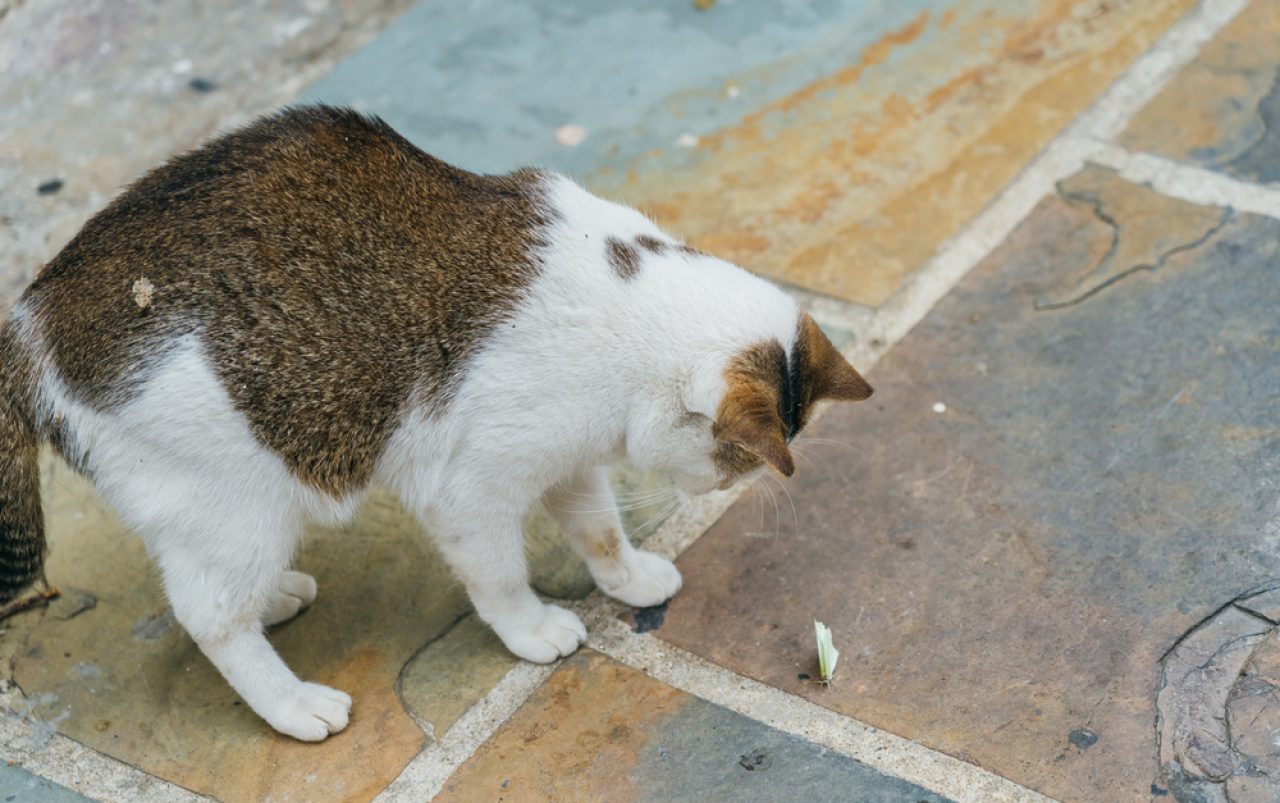
We can’t talk about the whole “can cats eat moths” thing without touching upon the history of these winged creatures. “What are moths? Are moths and butterflies the same? Where do moths come from AND are they dangerous to me and my four-legged friend?” Let’s start from the beginning!
Moths belong to the Lepidoptera family (along with their more popular counterparts, butterflies). The very word Lepidoptera hides the explanation of months’ mystical beauty. Lepidoptera means “scaly-winged”, which perfectly showcases the fact that a moth’s wings are formed from thousands of little scales.
Moths and butterflies are often confused for each other. And, trust me, you’re not the only one who wasn’t sure whether your curious creature wanted to munch on one or the other. Moths and butterflies share the same biology (who’s surprised!?) and are far more similar than one might think.
But, the odds that your four-legged friend’s been trying to munch on a moth are far greater than the odds of her trying to catch butterflies. Not because she has a preference, but because moths are far more numerous than butterflies – with 160,000 species of moths compared to 17,500 species of butterflies.
And, we can’t forget about the fact that moths are underrated when compared to butterflies! Everyone’s stunned by the beauty of a simple butterfly (which seems fair). But, they’ve probably never hopped online and Googled Luna moths or Silk moths. And, what about the Lonomia, the most dangerous moth out there?!
So, there’s a good reason why moths are so good at stirring up your cat’s curiosity. Your cat can’t resist the thrill of the hunt, especially when she’s facing a winged, scaled creature that keeps flying away. But, that doesn’t answer the question of whether cats can eat moths without SOME repercussions.
Can cats eat moths?
Cats can eat moths! But… There’s always a but somewhere in there when we’re talking about your cat’s eating habits. She’s no different from other cats – and yet, she keeps driving you crazy with her constant attempt to snatch pretty much anything that comes within reach of her paws.
Cats are natural hunters (which would explain the need to jump at every opportunity to nibble on a moth, a butterfly, or a spider). And, they’re also carnivores. On the off chance that you’ve been living under a rock since the dawn of time, that means that they feed off of meat, animal protein, and animal nutrients.
They need lots of protein and fat in their diets to survive and thrive. They don’t need fruits, veggies, and whole foods the same way humans do because they’re not omnivorous. And, they don’t even possess the enzymes necessary to break down and process most foods humans eat on a regular.
Now, that means that they often have trouble digesting foods they’re not used to munching on (or they’re not supposed to munch on). Your four-legged friend might not be able to share a glass of milk with you or enjoy a charcuterie night because she can’t process lactose.
Or, she might not be able to scoff down an entire slice of pizza with you because she can’t deal with that many calories and carbohydrates. Her ancestors spent their lives hunting prey and feeding EXCLUSIVELY off of the prey’s meat, bones, and the insides of the prey’s stomach.
Wild cats do the same thing – but, your not-so-wild cat doesn’t necessarily hunt rabbits and birds. That’s not to say that she doesn’t try (oh, she does!). But, she’s never gotten far with her attempts… until she started hunting moths, spiders, and other crawling creatures.
Can cats eat moths without experiencing any consequences?
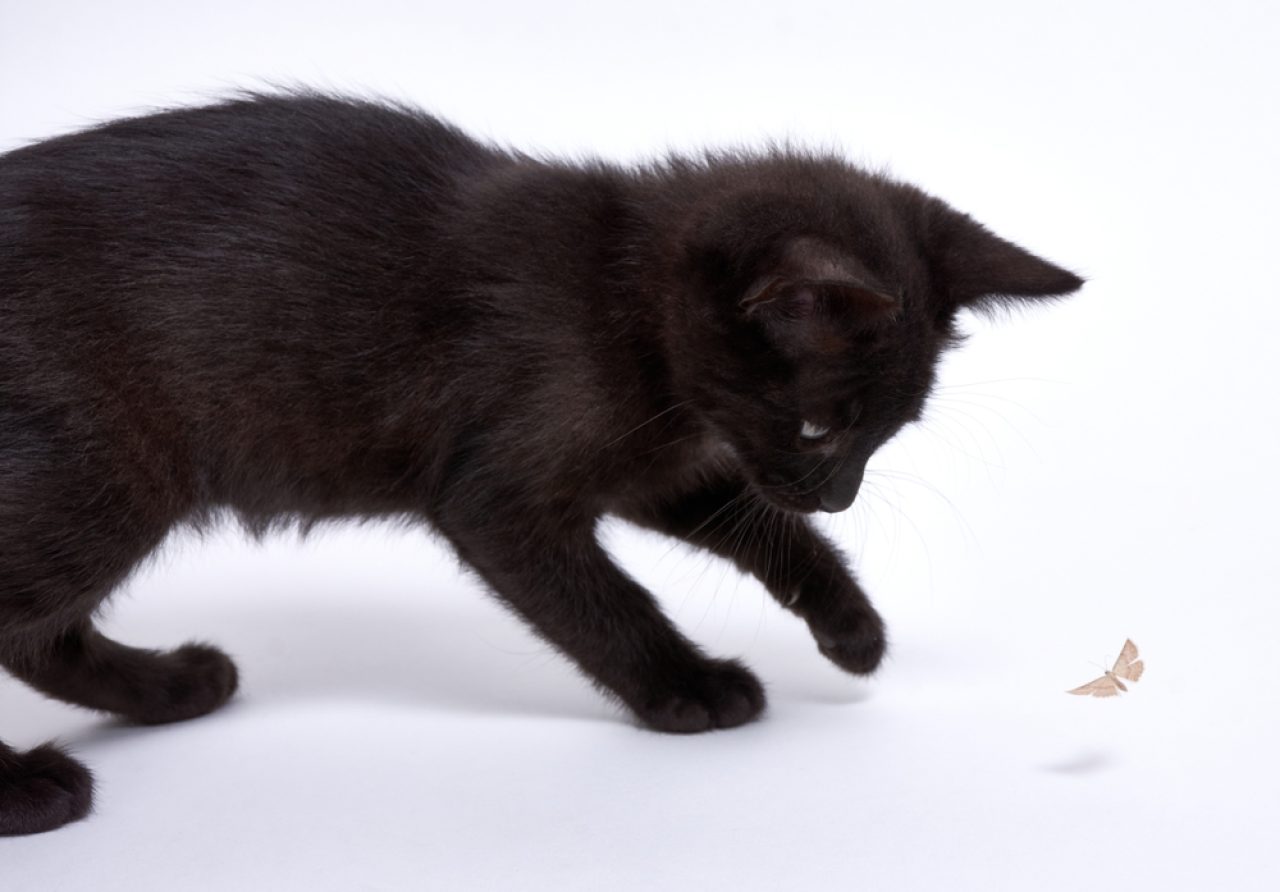
Actually, moths don’t come without a little bit of protein and a little bit of moisture which puts them in the “great for Mrs. McFluffer” category. Catching moths (and munching on them!) can be an amusing activity. It will help your cat develop her hunting instincts, and give her a little something to digest.
But, but, but… Anything that’s not supposed to be a part of your cat’s diet can find a way to become detrimental to her health. Munching on moths doesn’t come without the risks of experiencing an allergic reaction, developing digestive problems, or even choking.
1. Allergic reactions
That’s right! Cats can experience sensitivity to MANY things, and moths certainly aren’t the exception to that rule. These winged beats can even be poisonous to acts – certain moths carry toxins on their wings to defend themselves from predators.
These toxins can cause either an allergic reaction or symptoms of poisoning, depending on the amount she’s consumed and the type of moth she’s eaten. Regardless of everything, make sure to ALWAYS keep an eye on your four-legged friend when she’s playing with the backyard creatures.
Some of the most common symptoms that can give you a heads up that something’s off are weakness, wheezing, difficulty breathing, runny nose, watery eyes, drooling, skin irritations and rashes, and even gastroenteritis. Vomiting and diarrhea are also common signs your cat’s been eating something she shouldn’t.
Contact your vet the moment that you notice any of these symptoms – schedule an appointment or (given that she’s doing pretty bad after eating a moth) take her to the emergency animal center. Either one of them should be up-to-date on what she’s been nibbling on before ending up on the table.
2. Digestive problems
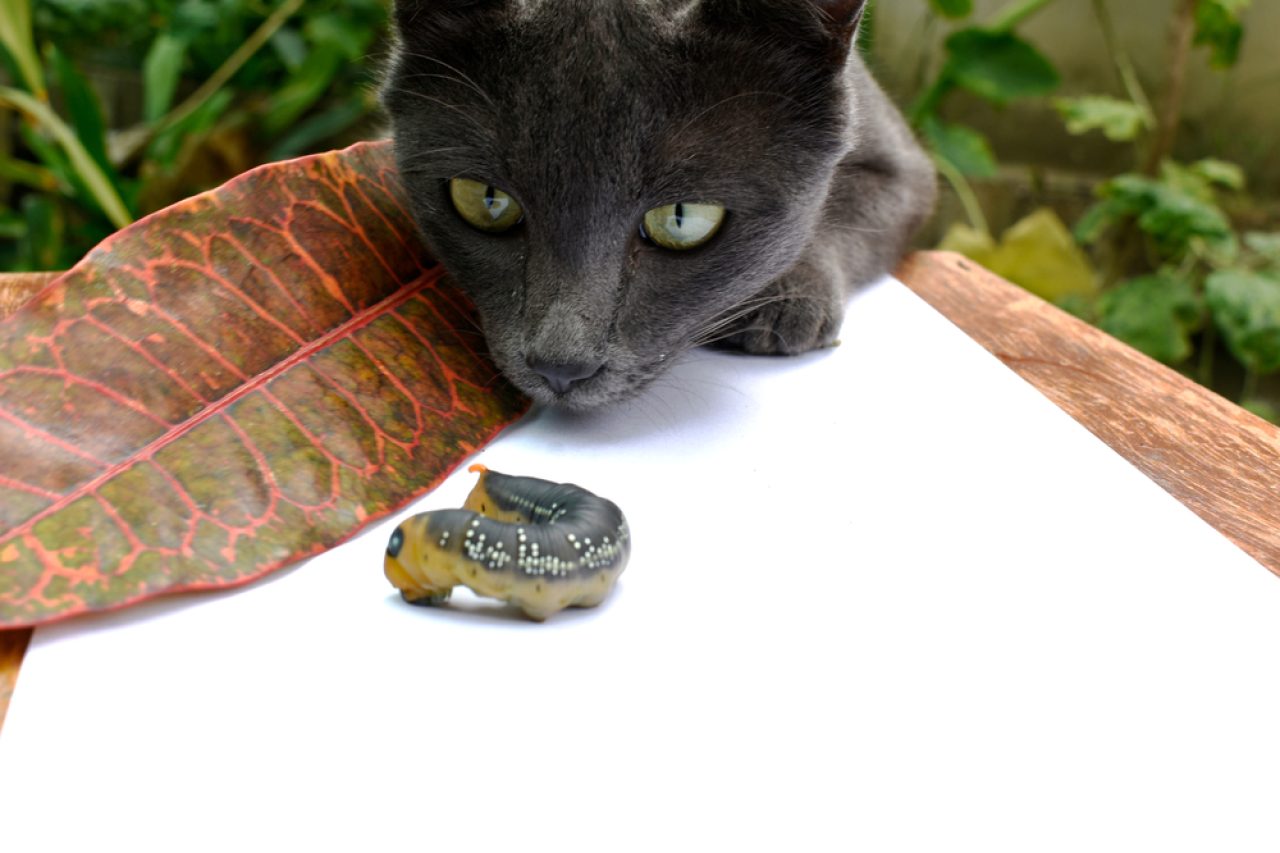
Cats can eat moths, but that’s not to say that these little stinkers won’t give your cat a stomachache. Cats are pretty sensitive when we’re talking about these things – eating anything that’s out of the ordinary can send them running to their litterboxes and ruining your carpets on the way.
Scoffing down a single moth shouldn’t be that big of a deal – especially when we’re talking about your regular, household staple type of moth. But, overeating moths can cause her to have an array of digestive problems such as nausea, bloating, vomiting, diarrhea, and even constipation.
Worry not; cats typically feel much better the moment that they get these things out of their system. Keep a close eye on her, provide her with plenty of fluids, and have your vet’s number on speed dial. On the off chance that something goes wrong, you can always schedule an appointment or pay them a visit.
Remember – any digestive problems that last longer than 24 hours tend to be a cause for concern. Make sure you’re keeping track of everything that goes on after the accident. You’ll have your facts straight IF you end up having to share them with your vet.
3. Choking hazard
“Whaaaat? Cats can choke on a moth?! On a mere butterfly?! Aren’t they descendants of lions and tigers!?” We don’t have to shame our precious purrincesses. But, we have to admit that they can get a little clumsy and cloddish. And moths can be pretty tricky to munch on because they wiggle and try to escape (ouch!).
On the other hand, bigger moths can get lodged somewhere down the digestive tract (mouth, throat, or esophagus). Make sure your cat doesn’t look like she’s struggling to breathe, coughing, or even pawing at her mouth – these are symptoms that she’s choking.
Contact your vet the moment that you notice your cat choking and ask for advice on how to help her. More times than not, your vet will advise you to investigate the inside of your cat’s mouth with your finger and try to remove the moth that way. She might even instruct you to do a cat Heimlich, so prepare yourself!
How to stop your cat from eating moths?
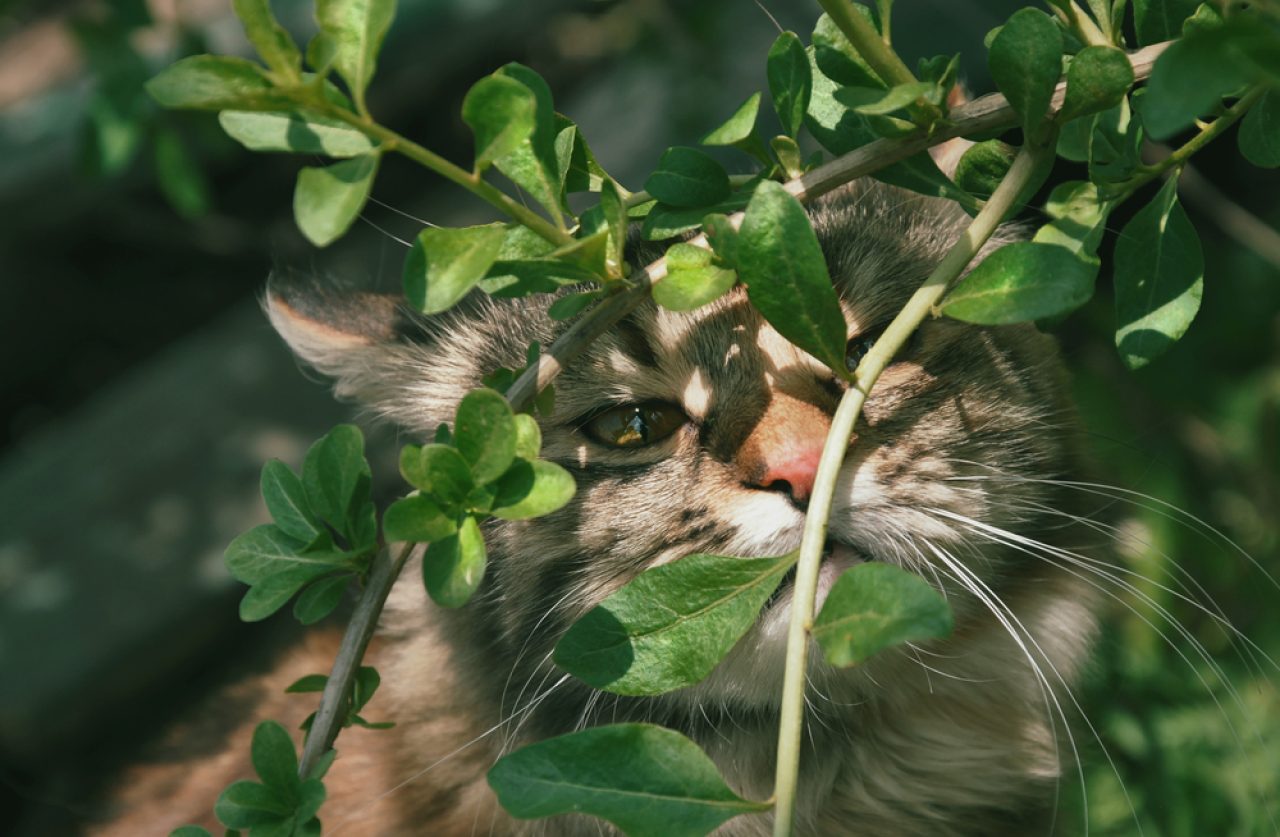
Cats can eat moths. But, you might not be that big on letting your precious pet munch on whatever creatures are crawling over your backyard. Worry not; there are ways to discourage your pet from chasing after moths, butterflies, spiders, and other pesky pests.
Before we go anywhere further with this – you should keep in mind that there’s nothing wrong with letting your cat chase after bugs. Such activities actually help your cat live healthier and happier. They develop her hunting skills, push her to be more active, and teach her valuable lessons.
That being said, there’s nothing wrong with wanting to achieve those things without hurting the poor little moth that’s been chillin’ on your porch for two days. First things first, make sure your cat’s getting enough cat food and cat treats to satisfy her needs. This way, she doesn’t have to look for food someplace else.
Then, try to keep her busy and engaged with different toys. The more you play with her, the less she wants to go outside and play with her other “friends.” Try toys that mimic birds, mice, or even moths (IF you can find them) and she won’t be able to stop chasing you around the garden.
Last but not least, try staging hunting experiences for her. Make her think that she’s hunting – let her try to find cat treats you’ve hidden somewhere outside or even try to fight you to get a bite of chicken. Trust me; she’s going to remember such experiences for the rest of her little life.
Can cats eat other crawling creatures?
They sure can! But, you have to be very, very cautious not to let your cat eat something she shouldn’t. Cats can take care of themselves, and more times than not they’re capable of recognizing and avoiding dangerous situations.
But, that’s not to say that you shouldn’t consult with your vet. Make sure the two of you are on the same page. With that disclaimer out of the way, let’s take a look at some of the most common creatures your cat can wish to spar with.
1. Butterflies
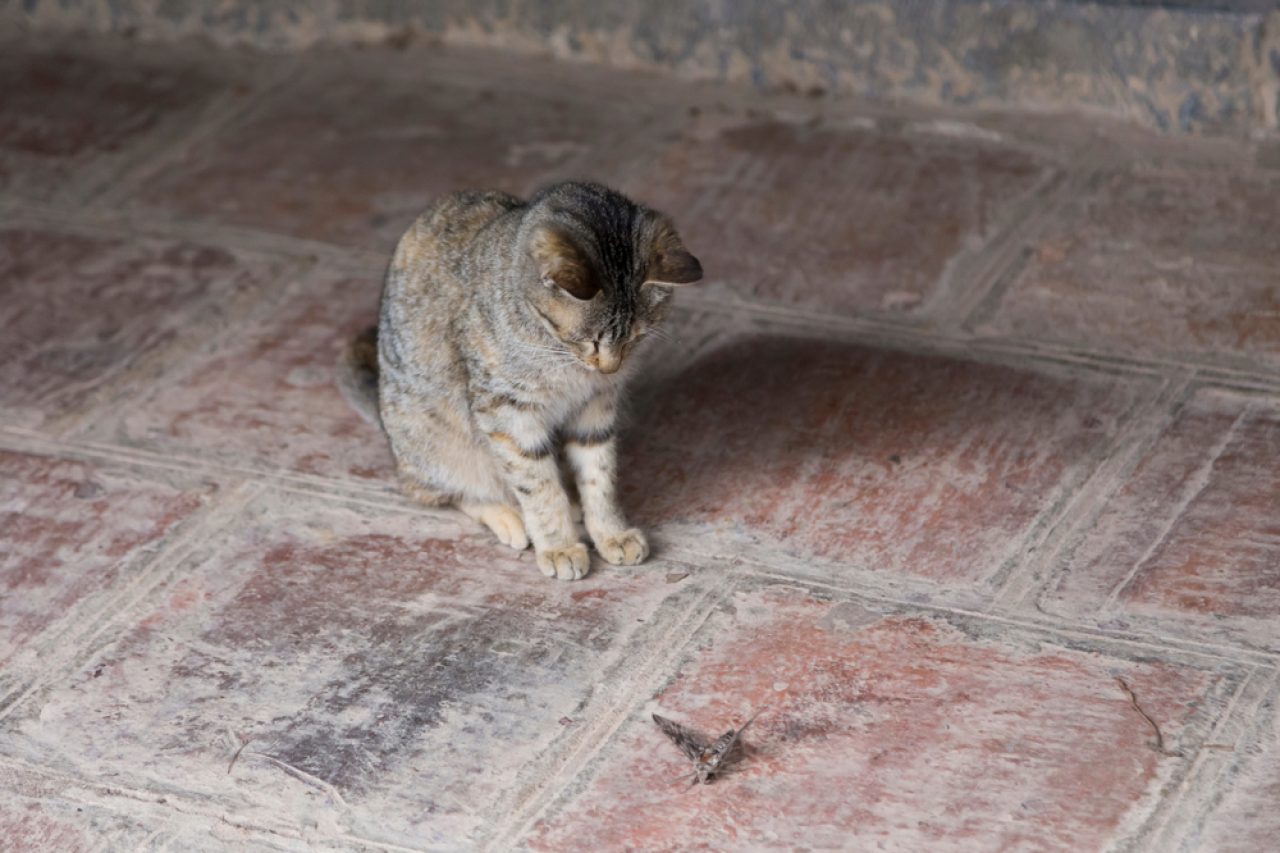
Cats can eat butterflies! That probably doesn’t come as a surprise to most pet parents who know that butterflies come from the same family as moths. Butterflies are pretty harmless to your four-legged friend. And, she shouldn’t experience any repercussions after munching on one.
But, that’s not to say that she can eat butterflies every single day. Overeating butterflies can cause a bunch of digestive problems such as nausea, bloating, vomiting, and diarrhea. Cats with sensitive stomachs can even experience symptoms resembling those of an allergy or poisoning.
If you have any reason to believe your cat’s not feeling her best because she’s eaten a butterfly, consult with your vet. Don’t shy away from seeking professional help – you’re better off being safe than sorry.
2. Caterpillars
Now, this one might surprise you because cats can’t actually eat caterpillars. Our friends over at the ASPCA don’t recommend letting your cat eat a caterpillar. According to them, these little stinkers can be poisonous to your cat because of those little hairs they have all over their body.
These little hairs can be urticating and stinging – the first type can cause skin irritations, rashes, hives, and dermatitis while the second type can cause discomfort, erythema, edema, and even poisoning. Trust me; you don’t want either of them anywhere near your cat’s mouth.
Moths and butterflies might be safe for your cat, but their caterpillars are OUT. OF. THE. QUESTION. Make sure to contact your vet the moment that you notice your feline friend playing with a caterpillar. She might not eat one, but she’s putting herself at risk of being stung by those little hairs.
3. Spiders
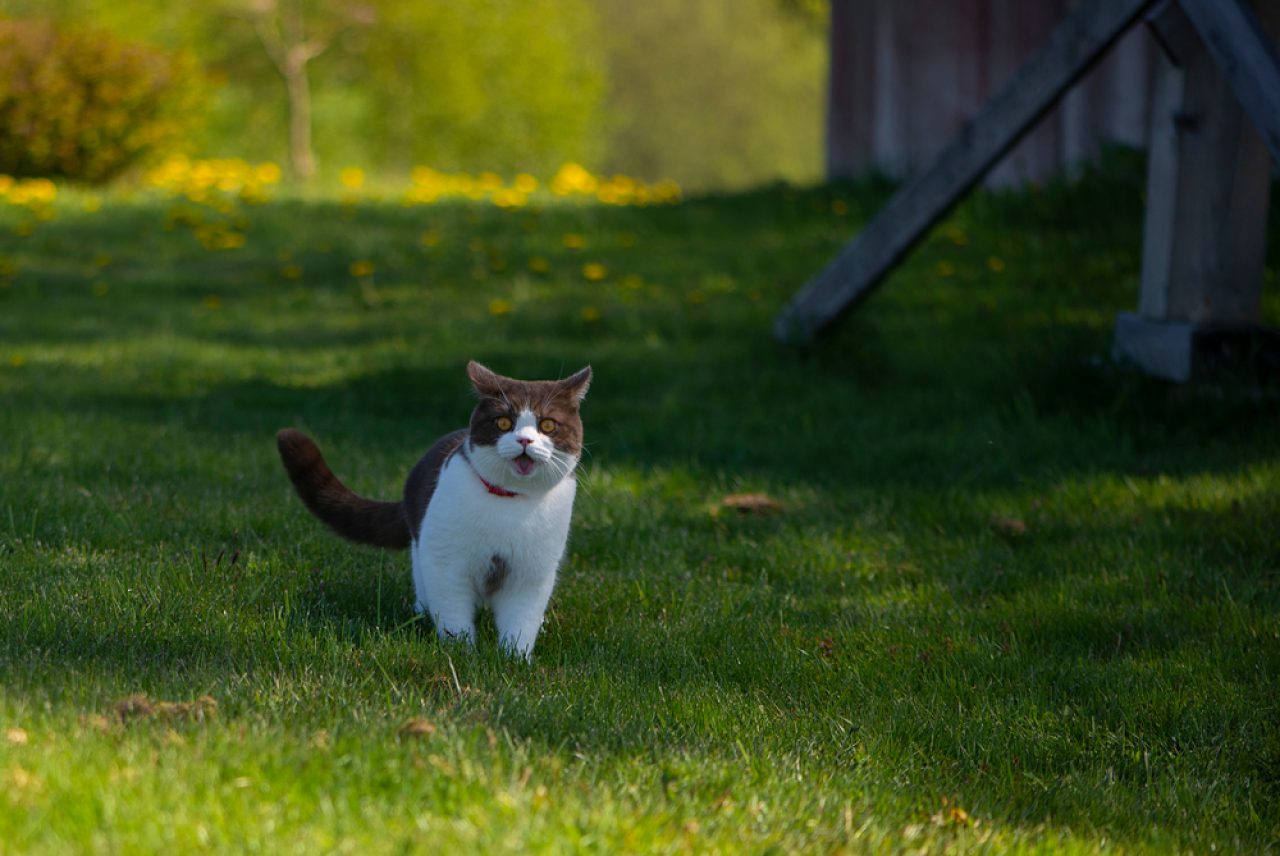
Cats can eat spiders! Believe it or not, cats can eat pretty much every spider out there (even the venomous ones!) without any repercussions. Their digestive systems are equipped with enzymes necessary to break down and process venom the moment that they eat the spider.
And, most spiders don’t even like to attack cats. They prefer to hide and run away whenever they face her threatening smirk. Cats can provoke them (pushing them with their paws, chasing after them) which can cause an attack. But, cats aren’t likely to suffer side effects from a spider’s bite (NO, your cat’s not gonna turn into a Spider cat!)
4. Flies
Cats can eat flies! Worry not; your cat can play with flies as much as she wants to. Flies can even provide your cat with a bit of protein. And we can’t forget about the fact that flies can give your precious purrincess the active lifestyle that she needs.
But, flies can carry bacteria and parasites. Make sure you keep a close eye on your cat whenever she’s playing with flies. Consult with your vet, and keep track of anything out of the ordinary after she finishes with her playdate.
So, can cats eat moths?
Cats can eat moths! These winged creatures won’t cause harm to your feline. Given that she doesn’t scoff down a dozen of them at once. The venomous types of moths might be a cause to visit your vet. But, they’re not likely to be detrimental or fatal.
Read more: Why Is My Cat Eating Ants? What’s Up With That?

